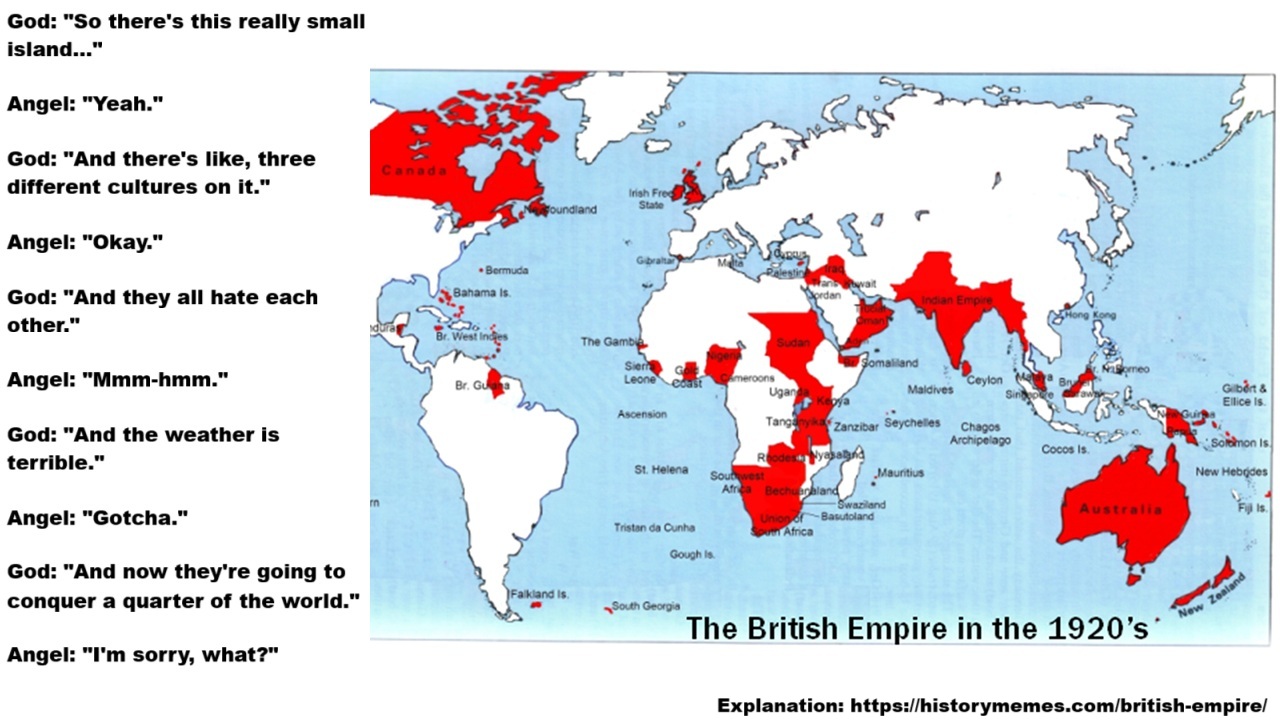
The map and meme above lend some support to the idea that God Is an Englishman (or if not English at least British).
Here’s the text and more details:
God: “So there’s this really small island…”
Angel: “Yeah.”
God: “And there’s like, three different cultures on it.”
Angel: “Okay.”
God: “And they all hate each other.”
Angel: “Mmm-hmm.”
God: “And the weather is terrible.”
Angel: “Gotcha.”
God: “And now they’re going to conquer a quarter of the world.”
Angel: “I’m sorry, what?”
How did Britain rule 1/4 of the world?
Great question! It really does seem unbelievable that a relatively small island like Britain ended up ruling a quarter of the world’s land and population at its peak.
Geography and Naval Power
- Being an island forced Britain to become a seafaring nation.
- The English Channel gave natural protection against continental invasions (unlike France or Germany, who had to constantly defend borders).
- Investment in shipbuilding and navigation turned Britain into the strongest naval power by the 18th century.
The Age of Exploration (16th-17th centuries)
- Britain joined Spain, Portugal, France, and the Netherlands in overseas exploration.
- Privateers, traders, and companies like the East India Company started colonies and trading posts in the Americas, Africa, and Asia.
- The Protestant Reformation and rivalry with Catholic Spain/France pushed Britain outward.
Colonial Trade and Wealth
- Colonies provided raw materials (sugar, cotton, tea, tobacco, spices) and became markets for British manufactured goods.
- The triangular trade, including slavery, brought immense profits.
- London developed into a global financial hub.
Industrial Revolution (18th-19th centuries)
- Britain industrialized first, giving it massive economic and technological advantages.
- Steamships, railways, and weapons made it easier to conquer and control distant lands.
- Factories demanded raw materials (cotton, coal, metals) and global markets.
Divide and Rule
- Britain often exploited local divisions to gain control:
- In India, they allied with certain rulers against others.
- In Africa, they used tribal and ethnic rivalries to maintain dominance.
- A relatively small number of British administrators and soldiers ruled over millions by co-opting local elites.
Naval Supremacy & Strategic Points
- The Royal Navy dominated global seas, protecting trade and colonies.
- Britain controlled key chokepoints: Gibraltar, Suez Canal, Singapore, Cape of Good Hope.
- “The empire on which the sun never sets” was possible because of this global naval network.
Decline
- World Wars I and II weakened Britain financially and militarily.
- Colonies pushed for independence (India in 1947 being the turning point).
- By the mid-20th century, the empire dissolved into the Commonwealth of Nations.
Ok but what about God, Christianity and the British Empire?
Christianity was deeply tied to the growth, maintenance, and ideology of the British Empire.
Here’s how it fits into the bigger picture:
Early Justification
- When Britain first started colonizing (16th-17th centuries), religion was a major justification.
- Colonization was framed not only as economic expansion but also as a mission to spread Protestant Christianity, especially in contrast to Catholic Spain and France.
- Colonies in North America were sometimes explicitly founded by religious groups (e.g., Puritans, Quakers).
Missionary Activity
- From the 18th century onward, missionary societies (like the Church Missionary Society or the London Missionary Society) spread Christianity in Africa, Asia, and the Pacific.
- Missionaries often travelled with traders or settlers, introducing schools, printing presses, and Western education.
- In many places, missionaries translated the Bible into local languages, creating written forms for previously oral languages (e.g., Zulu, Xhosa, Maori).
Religion and “Civilizing Mission”
- The empire often used Christianity as part of its “civilizing mission” ideology, the idea that Britain was bringing not only progress, law, and trade but also moral uplift through Christian faith.
- This was sometimes called the White Man’s Burden (after Kipling’s famous poem), presenting empire as a moral duty.
- In practice, this justified control over colonized peoples by portraying them as “backward” and in need of salvation.
Tension Between Missionaries and Empire
- Interestingly, missionaries weren’t always on the same page as imperial authorities:
- Some defended indigenous peoples against exploitation (e.g., in Africa or the Pacific).
- Others clashed with settlers, who wanted land and labor, while missionaries wanted to convert and protect native communities.
- But overall, the presence of missionaries softened local resistance to empire by providing education, healthcare, and religious structure that was tied to British culture.
Christianity and Identity
- Christianity helped Britain define its empire as morally superior to rivals.
- Protestant identity was key in Britain’s rivalry with Catholic France and Spain.
- In colonies like India, Christianity was both a religion and a tool of cultural dominance, used in schools, government service, and law.
Legacy
- Today, Christianity remains one of the most lasting legacies of the British Empire:
- Countries in Africa, the Caribbean, and Oceania are predominantly Christian due to missionary activity.
- English-language Bibles became widespread.
- Missionary schools laid the foundation for modern education systems in many postcolonial nations.
In short: Christianity was both a moral justification for empire and a tool of imperial power.
It spread alongside British trade and armies, shaping cultures and societies in lasting ways, though not without resistance, adaptation, and deep controversies.
More on the rise and fall of the British Empire:
- Empire: How Britain Made the Modern World
- The Rise and Fall of the British Empire
- Legacy of Violence: A History of the British Empire
- The Empire Project: The Rise and Fall of the British World-System
- Protestant Empire: Religion and the Making of the British Atlantic World
- The Truth About Empire: Real Stories of British Colonialism
What do you think?
Leave a Reply